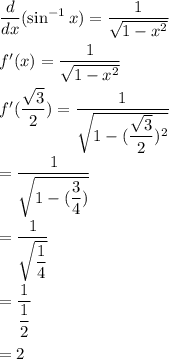
Advanced Placement (AP), 03.01.2021 15:50 maria241432
If f (x) = sin−1x, then f′(√3/2)= ?

Answers: 3


Other questions on the subject: Advanced Placement (AP)

Advanced Placement (AP), 22.06.2019 07:30, yenielrivera30
The roman empire fell around the 5th century, and as islam spread in the 7th century, trade between europe and china slowed. chinese traders were blocked from westward expansion into europe when the chinese army was defeated by muslim fighters in the area known as syr darya. the trade routes, known as the silk road, fell into disuse, and trade between the far east and europe nearly stopped. it wasn't until the 13th century when the mongols invaded and controlled central asia and large parts of the middle east that extensive trade along these routes was opened again. based upon the paragraph above and your knowledge of the mongols, which of the following statements is correct? a. the mongols unified regions along the silk road, allowing for safe transport of goods. b. muslims controlled busy trade routes into china from the 5th to the 7th centuries. c. without access to european markets, the chinese were unable to obtain raw materials. d. the mongols replaced the roman empire as the dominant force in western europe.
Answers: 1

Advanced Placement (AP), 22.06.2019 10:00, niescarlosj
Match the terms with the appropriate descriptions. 1. font readers often have difficulty making it to the end of this sort of email 2. spam or chain letters never forward these 3. language, vocabulary, and tone these should be appropriate for the receiver of your message 4. permanent the style, size, and color of this should be easy to read 5. long and rambling email is this sort of written record
Answers: 3

Advanced Placement (AP), 24.06.2019 00:10, beckyroof5158
How do astronomers measure the amount of dark matter in the universe
Answers: 2

Advanced Placement (AP), 24.06.2019 06:00, tyquanvicks13
In a government based on the consent of the governed, who has the ultimate authority?
Answers: 2
You know the right answer?
If f (x) = sin−1x, then f′(√3/2)= ?...
Questions in other subjects:



Mathematics, 02.12.2020 20:40

English, 02.12.2020 20:40

Mathematics, 02.12.2020 20:40


English, 02.12.2020 20:40

Mathematics, 02.12.2020 20:40


English, 02.12.2020 20:40

 " will be "2".
" will be "2".








 = 2
= 2



